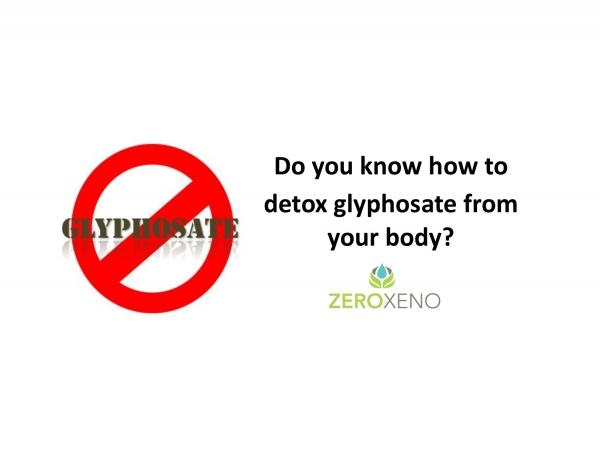Our products are proudly manufactured in Canada and a product of Canada.
Glyphosate Detox
October 10, 2018

Glyphosate, chemically known as N-(phosphonomethyl)glycine, is a herbicide that's been in use since the 1970's. In the US alone, over 1.6 billion kilograms of glyphosate have been sprayed on plants between 1974 - 2015, with two-thirds applied over a 10 year period from 2004 - 2014. Between 1994 - 2014 the global use of glyphosate has been estimated at 8.6 billion kilograms and is expected to remain the most widely applied pesticide worldwide. Glyphosate is an endocrine disruptor that's known to negatively impact both androgen receptors and estrogen cell signaling with links to breast cancer. Recent studies implicate glyphosate in a multitude of issues that are currently plaguing our globe.
If It's Broken It Needs to be Fixed
Glyphosate disables the shikimate pathway found in plants and bacteria and subsequently kills them both. The shikimate pathway is a set of seven enzymatic reactions that synthesize (create) essential compounds the human body requires. Humans are dependent on the shikimate pathway that plants and probiotic bacteria use to produce vitamin B9 (folate) and the aromatic amino acids, phenylalanine, tyrosine, and tryptophan. The human body cannot utilize the shikimate pathway but instead relies on friendly strains of Lactobacillus and Bifidobacterium to safeguard against folate deficiency. Reduced beneficial bacteria in the gut quickly leads to an overgrowth of pathogenic bacteria, in particular Salmonella, which is resistant to glyphosate. Inadequate levels of folate are linked to colon cancer and inflammation that folate-producing bacterial strains provide protection against. The three aromatic amino acids produced by the shikimate pathway are considered essential components of protein synthesis.
By now you may be asking what the shikimate pathway has to do with detoxifying glyphosate from your body? I'm confident that everyone would agree when something is broken it needs to be fixed. While there are no concrete studies that describe how the body removes glyphosate, it is scientifically proven to have a relatively short half-life of 5 to 10 hours. In short this means after 10 to 20 hours, your body has effectively removed the nasty hormone disrupting herbicide from its system, which of course is great news. However, the damage that's left behind is similar to what a hurricane leaves in its wake - destruction, decimation and denuding.
The War Can be Won
Your gut has been through a war and your army of beneficial bacteria are dead, leaving the landscape of your intestinal walls stripped naked and bare. If left in this fractured state, the enemy, Salmonella and other pathogenic bacteria, can quickly move in and populate the now empty land. The lack of folate (B9) and aromatic amino acids in your system will leave you weak and vulnerable. Vitamin B9 (folate) helps form red and white blood cells and is also necessary for the production of DNA. Without adequate supplies of natural folate you'll be susceptible to anemia, infections and low cellular energy. Deficiencies in the aromatic amino acids phenylalanine, tyrosine, and tryptophan can lead to depression and sleep deprivation.
However, if you are wise, you'll be ready to introduce another set of troops to repopulate and reclaim your land. Studies on Lactobacillus and Bifidobacterium have shown these beneficial bacteria have strong antimicrobial activity against Salmonella and are capable of overcoming the negative impact glyphosate has had on the terrain of your gut. In most wars, the battle is won through the careful implementation of three things; strategy, diversity and numbers. These same concepts hold true in your battle against glyphosate. The fermented foods you strategically choose to eat, the different varieties you pick and the frequency with which you consume them, will help to ensure you win the long game.
Your strategy need not be complex or complicated. Become familiar with the various types of fermented foods available at your neighborhood health food store or choose to make your own. A small bowl of yogurt in the morning or a glass of milk kefir is simple and easy. Sauerkraut in your sandwich at lunch time, washed down with some homemade water kefir or kombucha is always yummy. Some fermented kimchi or pickles with your dinner will complete your meal. If you want to go the extra mile, you can also supplement your diet with probiotics purchased from your local natural health store.
Join The Zero Xeno Movement today!

by Bonnie Penner
All Zero Xeno (ZX Enterprises Inc.) products are for external use only. All advice and information posted on this website is from personal research and/or experience and is intended for general educational purposes. Our intent is not to diagnose, treat, cure or prevent any disease. The information on our site is not intended to be a substitute for professional medical advice related to specific medical conditions. We cannot diagnose illnesses nor confirm any claim as to therapeutic safety, effectiveness or course of treatment. Always seek the advice of your physician or other qualified health professionals for any concerns regarding your health. Only your physician can provide specific diagnosis and treatments. Please refer to our full Disclaimer for more details.
- Log in to post comments


